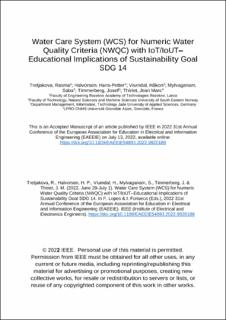Water Care System (WCS) for Numeric Water Quality Criteria (NWQC) with IoT/IoUT–Educational Implications of Sustainability Goal SDG 14
Tretjakova, Rasma; Halvorsen, Hans-Petter; Viumdal, Håkon; Mylvaganam, Saba; Timmerberg, Josef; Thiriet, Jean Marc
Chapter
Accepted version
Permanent lenke
https://hdl.handle.net/11250/3062775Utgivelsesdato
2022Metadata
Vis full innførselSamlinger
Originalversjon
Tretjakova, R., Halvorsen, H. P., Viumdal, H., Mylvaganam, S., Timmerberg, J. & Thiriet, J. M. (2022, 29. June-1. July). Water Care System (WCS) for Numeric Water Quality Criteria (NWQC) with IoT/IoUT–Educational Implications of Sustainability Goal SDG 14. I F. Lopes & I. Fonseca (Red.), 2022 31st Annual Conference of the European Association for Education in Electrical and Information Engineering (EAEEIE). IEEE (Institute of Electrical and Electronics Engineers). https://doi.org/10.1109/EAEEIE54893.2022.9820188Sammendrag
In most developing countries and evolving countries, availability of potable water is scarce, and the water sources are very often unattended or unmonitored. Island states have the additional problems associated with unheeded pollution from wastewater from the industries and household as well as various ships and tankers. Some of our research efforts have been focused on environmental pollution and continuous monitoring of water quality based on turbidity, temperature, and pH. We focus on selected numeric water quality criteria (NWQC) and present NWQC monitor using an IoT (Internet of Things) and IoUT (Internet of Underwater Things) platform concept, based on already existing systems. Based on field data, some results in monitoring water quality in selected applications are presented. An IoT/IoUT platform realized for monitoring air pollution in Problem-Based Learning (PBL) projects for BSc and MSc students, working with real data and focusing on developing environmentally friendly technological solutions seemed to motivate the students. The project is then extended to the realization of continuous supervision of the waters of both developed and developing nations using IoUT. Useful IoT/IoUT based alerts can reach these "digitalized" citizens, who can thus be trained to use these NWQC data for an environmentally conscious living and to exert pressure on regulators to safeguard water resources as well as to implement proper environmentally friendly wastewater management and water care system (WCS). Some results and practices with respect to NWQC in the EU, particularly in France and Germany will also be presented in this paper. Finally, the paper addresses one of the sustainability goals of the United Nations, SDG 14, using EE (Electrical Engineering) and IT tools with innovations for environmental protection.
